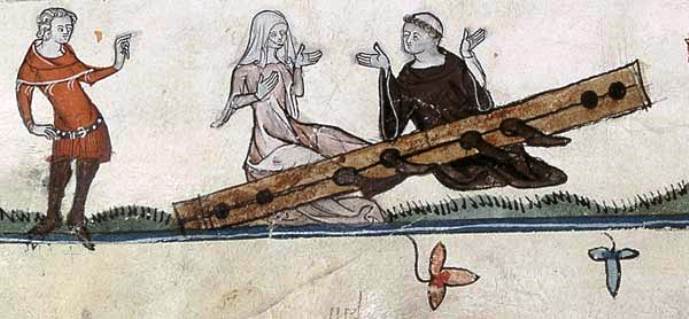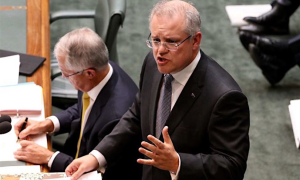 The spruiker
The spruiker
My Lords and my Ladies, I beseech your indulgence, here before your magnificent court, as I present for your amusement and moral edification the fourth iteration of the tale of Tiny Napoleon O’penmouth and his rival Mal C’od-turn-a-bull. And a new rival emerges but you must await my tale for that revelation — forgive my teasing jest but I am here to tease, entertain and to charm.
I will, however, refresh your exalted ears and remind you of the rise of Mal C’od-turn-a-bull in my last tale, when the Lords and Ladies of Tiny Napoleon O’penmouth’s kingdom secretly plotted his downfall — he had vastly inflated his own importance which they could not abide. Mal C’od-turn-a-bull was their man, a man who understood their secret gold-making dealings behind the castle walls, as he had engaged in such dealings himself; a man who could calm rebellious peasants with his smile and mellifluous words; who could dupe the peasants into working longer and harder without them discerning a deception. Or so thought the Lords and Ladies of that glorious kingdom.
But, my, how the world changes!
The tale continues: the unedifying fall and improbable resurrection of Mal C’od-turn-a-bull
Mal C’od-turn-a-bull swept upon the kingdom with his smile. He beamed when he spoke to the peasants. He beamed when he spoke in the green great hall — once the bastion of Tiny Napoleon O’penmouth. He beamed when he dined discreetly in the great halls of the Lords and Ladies of the kingdom.
The peasants were beguiled by the smile but less so his endless words. Whereas Tiny Napoleon O’penmouth spoke in three words, Mal C’od-turn-a-bull spoke in three hundred. Peasants were soothed to sleep before he had finished or scurried back to their dank fields and cough-inducing forges rather than await the two hundredth, let alone the three hundredth word. Perhaps Tiny Napoleon O’penmouth’s three-word bombast was easier on the ear, simpler to grasp or ignore as fancy took — at least it was quickly over!
As forewarned at the end of my last tale, Tiny Napoleon O’penmouth and his coterie of goblins did not forsake their taste of power nor their lust to return to it. In gloomy nooks of the green great hall they chatter, they spit, they quietly, and sometimes less than quietly, mock Mal C’od-turn-a-bull, disparage his loquaciousness.
In truth, Mal C’od-turn-a-bull’s verbosity has withered in recent times. He is fortunate if he can stretch his thoughts to one hundred words and even such words as there are seem to bemuse the peasants, no longer pacifying or mollifying them.
‘What have you done?’ they jeer in unison.
Mal C’od-turn-a-bull is no longer confident he has an answer.
Bear with me my Lords and Ladies as I take you back a step. How did it come to this? How did Mal C’od-turn-a-bull lose the brilliant lustre of his sweeping arrival across the kingdom? How did his words lose their ability to calm the peasants? And how long will the Lords and Ladies of his kingdom leave him unfettered if he cannot deliver all that he promised them, all they require of him?
While the unending ebb of words may have left peasants scuttling away in any direction they could, they did glean enough to believe that Mal C’od-turn-a-bull understood their plight. Obscured within those words they thought they heard promises that this land, this kingdom in which they belonged (and despite their fallen state they did believe they belonged), would provide them with riches beyond their current struggles, never as rich as the Lords and Ladies mind, but an easier life, with less struggle, less torment. They believed they heard promises that Mal C’od-turn-a-bull could ease the raging fires, could turn back the rising waters inundating their fields. They thought somewhere in those words were promises that the smoke would lift, that their children would not cough so much, nor die so often. Somewhere between the endless smile and the endless words there seemed to the peasants a new world.
But in the silences now left by Mal C’od-turn-a-bull (in what is the emptiness between the hundredth and three hundredth words), the goblins and Tiny Napoleon O’penmouth slither their forked tongues over the land. Nothing will change, they insinuate. Mal C’od-turn-a-bull is no more than Tiny Napoleon O’penmouth with a broader smile, a few more words but uttering nothing new.
Peasants stop and ponder. Can that be true? At first, they answer no, it cannot be.
Even in the green great hall, from its murky corners, the goblins expectorate their venom. We cannot have wealth and riches, we cannot have labour for the peasants, without the smoke streaming upon the landscape from the forges. The death of a few children is but the price we must pay. We cannot have more ploughs, more axes, more swords or barrel hoops. We cannot have more barrels even for the peasants’ beer (nor the Lords and Ladies’ wine) without felling more trees. Why doesn’t Mal C’od-turn-a-bull tell you this? The words hang in the stillness, in the eddying but silent maelstrom of their denunciation.
The peasants ponder.
The tree monks preach, as they had presaged, that Mal C’od-turn-a-bull is doing naught to stem the rising waters nor the constantly returning fires.
The peasants ponder. They take more heed of Mal C’od-turn-a-bull’s words and of his silences.
With reborn clarity they see Mal C’od-turn-a-bull tarrying longer, secreted in the castles of the Lords and Ladies. When he emerges he carries words of grand new schemes for the kingdom, but schemes whereby the Lords and Ladies can shroud their riches in veils of uncertainty, schemes whereby they can shed their money in far kingdoms.
‘But if the money goes to far kingdoms, what money will we have left here?’ a peasant asks but not a soul answers. The question lingers in their pondering.
Now among themselves, the peasants ask more and ever more questions. Some make their way to the ears of Mal C’od-turn-a-bull but somehow his words, and now his silences, no longer answer them. A smile, the mellifluous flow of his words is no longer enough. His words grow shorter and so too does their meaning.
For the peasants, it seems the world he promised them is drifting away or being swept into a rising tide for the Lords and Ladies: it is their world that seems carried higher by the words and smile of Mal C’od-turn-a-bull, not that of the peasants which they thought had been his promise.
Behind their castle walls, the Lords and Ladies huddle, mutter disconcertingly at the apparent fall from grace of the man they had themselves selected. To topple Tiny Napoleon O’penmouth they resorted to whispers of revolting peasants and now those whispers grow more real with each passing day, with each day in the apparent demise of their man. The peasants grow alarmingly disenchanted with the world as they see it and that alarms the Lords and Ladies.
The paper castle that so long protected Tiny Napoleon O’penmouth rises phoenix-like and its protrusions enfold him. It does not yet lift Tiny Napoleon O’penmouth to renewed grandeur, although it offers enduring glimpses that such a renewal is possible. Despite his own fall, Tiny Napoleon O’penmouth again feels invincible as the paper castle once more cloaks him from harm.
The peasants ponder the news of the criers. They gather under the trees. They gather at their forges, halting their work.
‘What has Mal C’od-turn-a-bull done?’
‘Nothing.’
‘Nothing for us. But the Lords and Ladies are doing all right.’ If such rebellious words reach the Lords and Ladies, their founded fears will heighten, shuddering the tranquility of their nightly feasts.
‘Has he stopped the fires?’ a lurking tree monk interjects.
The heads of the peasants shake in unison.
‘Are we any better off?’
Wise heads shake again.
‘What can we do?’
The faces are puzzled. ‘What can we do?’ they quietly contemplate but cannot uncover an answer. The only beckoning alternative is the return of Tiny Napoleon O’penmouth and none are prepared for that.
‘He has stopped the yeomen riding against us,’ a milder voice intervenes.
A murmured ‘yes’ falters among the group. Yes, there are fewer missing peasants (the matches hidden in their pockets) being spirited away to far, secret dungeons; the yeomen and knights ride less often in the peasants’ villages and that is a good thing they concede.
‘O’penmouth would never have allowed that. Our people would yet be living in fear.’
The heads nod, a muffled yes accompanying the movement. Yes, they understand deep within their beings that the return of Tiny Napoleon O’penmouth would revisit dark days, vengeful nights and dread.
The groups resume cutting the forests, firing up the forges, tilling the muddied fields. What else can they do? Mal C’od-turn-a-bull no longer inspires them, no longer offers a gleaming future. But if the only alternative is O’penmouth, what can they do? What can they do? constantly repeats in peasant minds across the kingdom.
But in the green great hall, among the peasants convened there for the diversion and amusement of the goblins, clowns and jesters, is one called William the Short’un and his name is spreading. Occasionally from the floor of the green great hall, he advocates another way, dares offer a path that involves neither O’penmouth nor C’od-turn-a-bull. His words run like flames between the workplaces and hovels of the peasants. How can that be? the peasants wonder. How can that be? they ask of their neighbours by the dim light of their evening fires.
William the Short’un says he can be master of the green great hall. At first no one believes that someone barely a rung above the peasants can do that but William the Short’un keeps repeating he can, he can do it, he can. Perhaps, they reflect.
Mal C’od-turn-a-bull recoils at the thought: ‘How can such a lowly upstart threaten me. Me!’ he muses. O’penmouth dismisses it: ‘William the Short’un is a man of straw,’ he darkly declares and his goblins splutter and hiss their agreement.
The Lords and Ladies tremble hesitantly beside their fires. Their worst fears are looming nightmare-like. The peasants are revolting but not in a way readily suppressed. There is no destruction, no storming of castle walls but still they affright at the prospect. The peasants are rallying behind William the Short’un, heeding his words, daring believe he can lead them into the green great hall.
Never! the Lords and Ladies think almost as one, from castle to castle across the kingdom. Such a peasant leader is unthinkable!
Emissaries ride between their castles. Lords and Ladies congregate. They dine and wine sumptuously, debating (perhaps slurring) what ought be done, who can be their saviour, and all so slowly and all so reluctantly they come to only one conclusion. Despite his failing glimmer, only Mal C’od-turn-a-bull can repel the affront. Only Mal C’od-turn-a-bull can shield their influence and ensure the Lords and Ladies are left to continue their nefarious business. Like the peasants, they cannot countenance the return of Tiny Napoleon O’penmouth.
Mal C’od-turn-a-bull is summoned. The Ladies depart the great hall. The Lords turn their icy gaze upon him. Before a word is spoken, Mal C’od-turn-a-bull feels the frostiness settling in the vastness of that resplendent space. There is no gain in speaking and he simply awaits the words of the Lords to weigh upon him.
‘You cannot allow William the Short’un to usurp you. You cannot allow Tiny Napoleon O’penmouth to manipulate you or meddle in our … er … your plans. You cannot allow our ventures to be diminished. The kingdom depends upon them, upon us. And now you! Do what you must.’
They say no more and Mal C’od-turn-a-bull, like Tiny Napoleon O’penmouth before him, is summarily dismissed, escorted to the doors by four surly guards. The world is descended on his shoulders. Now he must find a way to vanquish William the Short’un.
In the seclusion of his own grand castle, Mal C’od-turn-a-bull contemplates his future, agitates his ample mind on fulfilling his destiny — how he can bring down the upstart Short’un? As he sips another fine wine from another far kingdom, he glowingly foresees his place back among the Lords and Ladies and realises that can, in a perverse manner, also be his redemption. He will regale the peasants with tales that William the Short’un is dealing with the Lords and Ladies; that William the Short’un is feasting at their tables, drinking their wine and doing their bidding. That he is not the peasants’ man at all but only feigns to be.
And he can also preach the opposite, he smirks contentedly, that William the Short’un will frighten the Lords and Ladies to abandon their benevolence to the peasants toiling on their land, or to abandon their land altogether leaving no work for the peasants. How will you survive then? he will ask of them. He is convinced the peasants have no nose for inconsistency — in his own splendour, he is self-assured they have not the wit to notice, that some will believe one tale and some the other. Yes, his plan is well crafted, mendacious and built upon the peasants’ ignorance. He strides more confidently when he returns to the green great hall, with even a hint of his former smile.
‘Only I, Mal C’od-turn-a-bull, offer the safety and surety of life continuing as normal, no threats of change, no threats of uncertainty. Only I, Mal C’od-turn-a-bull can ensure our kingdom achieves new riches.’ More duplicity that he is positive will elude the dull peasants.
Yes, Mal C’od-turn-a-bull believes again he can win favour with the Lords and Ladies and continue as master of the green great hall just as it should be, just it was ordained.
Who will emerge victorious in the coming jousts? Who will prosper in the clashes between Mal C’od-turn-a-bull, Tiny Napoleon O’penmouth and his goblins, and William the Short’un?
My Lords and Ladies, journey with me when next I come before your glorious court to continue this tale and reveal to you the grand battle and who may be vanquished.
What do you think?
Who will emerge victorious?
Can Mal C’od-turn-a-bull keep Tiny Napoleon O’penmouth and his goblins at bay?
Can William the Short’un convince the peasants there is a place for them in his new world or will Mal C’od-turn-a-bull beguile them with his mendacity that William the Short’un cannot be trusted?
Will the peasants notice Mal C’od-turn-a-bull’s contradictions? Are they really as ignorant as Mal C’od-turn-a-bull believes?
So many questions. Please leave your answers in a comment.
Recent Posts

Divining the federal budget
Ad astra, 30. April 2016
Some of you may question the purpose of trying to divine what will be in the May 3 federal budget when the Turnbull Ship of State seems to be all at sea, wallowing towards an uncertain destination, facing strong headwinds, its sails flapping, its hull leaking, with a dithering Captain at the helm, a loquacious and at times incoherent First Mate insisting he knows where he’s going, and a motley crew.
More...

Policy from behind the scenes
Ken Wolff, 27 April 2016
Any good public servant will tell you that policy is determined by government ministers. In Senate Estimates, and other committees, you will often hear public servants say they cannot comment on policy issues, that such questions should be directed to the minister. That is the way our system works in theory but does it actually operate that way in practice?
More...

Castles in the Air
2353NM, 24 April 2016
One of the points of difference between the Turnbull Government and the Shorten Opposition is negative gearing. We would all still be here next week if the current regime and the proposals were discussed in full, so how about we attempt to do the ‘helicopter’ version. Just keep in mind that this article is general in nature and doesn’t consider your financial situation.
More...
Current rating: 0.5 / 5 | Rated 11 times